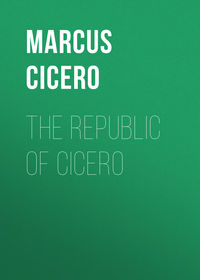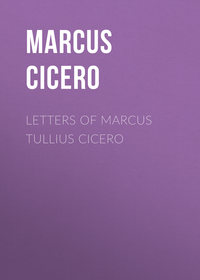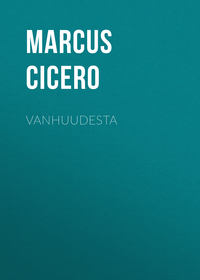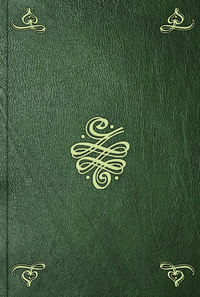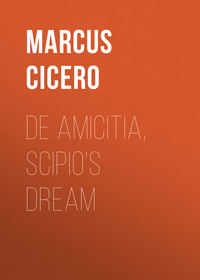 полная версия
полная версияCicero's Tusculan Disputations
109
Amphiaraus was King of Argos (he had been one of the Argonauts also). He was killed after the war of the Seven against Thebes, which he was compelled to join in by the treachery of his wife Eriphyle, by the earth opening and swallowing him up as he was fleeing from Periclymenus.
110
Calchas was the prophet of the Grecian army at the siege of Troy.
111
Helenus was a son of Priam and Hecuba. He is represented as a prophet in the Philoctetes of Sophocles. And in the Æneid he is also represented as king of part of Epirus, and as predicting to Æneas the dangers and fortunes which awaited him.
112
This short passage would be very obscure to the reader without an explanation from another of Cicero’s treatises. The expression here, ad investigandum suem regiones vineæ terminavit, which is a metaphor too bold, if it was not a sort of augural language, seems to me to have been the effect of carelessness in our great author; for Navius did not divide the regions, as he calls them, of the vine to find his sow, but to find a grape.
113
The Peremnia were a sort of auspices performed just before the passing a river.
114
The Acumina were a military auspices, and were partly performed on the point of a spear, from which they were called Acumina.
115
Those were called testamenta in procinctu, which were made by soldiers just before an engagement, in the presence of men called as witnesses.
116
This especially refers to the Decii, one of whom devoted himself for his country in the war with the Latins, 340 b.c., and his son imitated the action in the war with the Samnites, 295 b.c. Cicero (Tusc. i. 37) says that his son did the same thing in the war with Pyrrhus at the battle of Asculum, though in other places (De Off. iii. 4) he speaks of only two Decii as having signalized themselves in this manner.
117
The Rogator, who collected the votes, and pronounced who was the person chosen. There were two sorts of Rogators; one was the officer here mentioned, and the other was the Rogator, or speaker of the whole assembly.
118
Which was Sardinia, as appears from one of Cicero’s epistles to his brother Quintus.
119
Their sacred books of ceremonies.
120
The war between Octavius and Cinna, the consuls.
121
This, in the original, is a fragment of an old Latin verse,
122
The Latin word is principatus, which exactly corresponds with the Greek word here used by Cicero; by which is to be understood the superior, the most prevailing excellence in every kind and species of things through the universe.
123
The passage of Aristotle to which Cicero here refers is lost.
124
He means the Epicureans.
125
Here the Stoic speaks too plain to be misunderstood. His world, his mundus, is the universe, and that universe is his great Deity, in quo sit totius naturæ principatus, in which the superior excellence of universal nature consists.
126
Athens, the seat of learning and politeness, of which Balbus will not allow Epicurus to be worthy.
127
This is Pythagoras’s doctrine, as appears in Diogenes Laertius.
128
He here alludes to mathematical and geometrical instruments.
129
Balbus here speaks of the fixed stars, and of the motions of the orbs of the planets. He here alludes, says M. Bonhier, to the different and diurnal motions of these stars; one sort from east to west, the other from one tropic to the other: and this is the construction which our learned and great geometrician and astronomer, Dr. Halley, made of this passage.
130
This mensuration of the year into three hundred and sixty-five days and near six hours (by the odd hours and minutes of which, in every fifth year, the dies intercalaris, or leap-year, is made) could not but be known, Dr. Halley states, by Hipparchus, as appears from the remains of that great astronomer of the ancients. We are inclined to think that Julius Cæsar had divided the year, according to what we call the Julian year, before Cicero wrote this book; for we see, in the beginning of it, how pathetically he speaks of Cæsar’s usurpation.
131
The words of Censorinus, on this occasion, are to the same effect. The opinions of philosophers concerning this great year are very different; but the institution of it is ascribed to Democritus.
132
The zodiac.
133
Though Mars is said to hold his orbit in the zodiac with the rest, and to finish his revolution through the same orbit (that is, the zodiac) with the other two, yet Balbus means in a different line of the zodiac.
134
According to late observations, it never goes but a sign and a half from the sun.
135
These, Dr. Davis says, are “aërial fires;” concerning which he refers to the second book of Pliny.
136
In the Eunuch of Terence.
137
Bacchus.
138
The son of Ceres.
139
The books of Ceremonies.
140
This Libera is taken for Proserpine, who, with her brother Liber, was consecrated by the Romans; all which are parts of nature in prosopopœias. Cicero, therefore, makes Balbus distinguish between the person Liber, or Bacchus, and the Liber which is a part of nature in prosopopœia.
141
These allegorical fables are largely related by Hesiod in his Theogony.
142
Cicero means by conversis casibus, varying the cases from the common rule of declension; that is, by departing from the true grammatical rules of speech; for if we would keep to it, we should decline the word Jupiter, Jupiteris in the second case, etc.
143
Pater divûmque hominumque.
144
The common reading is, planiusque alio loco idem; which, as Dr. Davis observes, is absurd; therefore, in his note, he prefers planius quam alia loco idem, from two copies, in which sense I have translated it.
145
From the verb gero, to bear.
146
That is, “mother earth.”
147
Janus is said to be the first who erected temples in Italy, and instituted religious rites, and from whom the first month in the Roman calendar is derived.
148
Stellæ vagantes.
149
Noctu quasi diem efficeret. Ben Jonson says the same thing:
150
Olympias was the mother of Alexander.
151
Venus is here said to be one of the names of Diana, because ad res omnes veniret; but she is not supposed to be the same as the mother of Cupid.
152
Here is a mistake, as Fulvius Ursinus observes; for the discourse seems to be continued in one day, as appears from the beginning of this book. This may be an inadvertency of Cicero.
153
The senate of Athens was so called from the words Ἄρειος Πάγος, the Village, some say the Hill, of Mars.
154
Epicurus.
155
The Stoics.
156
By nulla cohærendi natura—if it is the right, as it is the common reading—Cicero must mean the same as by nulla crescendi natura, or coalescendi, either of which Lambinus proposes; for, as the same learned critic well observes, is there not a cohesion of parts in a clod, or in a piece of stone? Our learned Walker proposes sola cohærendi natura, which mends the sense very much; and I wish he had the authority of any copy for it.
157
Nasica Scipio, the censor, is said to have been the first who made a water-clock in Rome.
158
The Epicureans.
159
An old Latin poet, commended by Quintilian for the gravity of his sense and his loftiness of style.
160
The shepherd is here supposed to take the stem or beak of the ship for the mouth, from which the roaring voices of the sailors came. Rostrum is here a lucky word to put in the mouth of one who never saw a ship before, as it is used for the beak of a bird, the snout of a beast or fish, and for the stem of a ship.
161
The Epicureans.
162
Greek, ἀὴρ; Latin, aer.
163
The treatise of Aristotle, from whence this is taken, is lost.
164
To the universe the Stoics certainly annexed the idea of a limited space, otherwise they could not have talked of a middle; for there can be no middle but of a limited space: infinite space can have no middle, there being infinite extension from every part.
165
These two contrary reversions are from the tropics of Cancer and Capricorn. They are the extreme bounds of the sun’s course. The reader must observe that the astronomical parts of this book are introduced by the Stoic as proofs of design and reason in the universe; and, notwithstanding the errors in his planetary system, his intent is well answered, because all he means is that the regular motions of the heavenly bodies, and their dependencies, are demonstrations of a divine mind. The inference proposed to be drawn from his astronomical observations is as just as if his system was in every part unexceptionably right: the same may be said of his anatomical observations.
166
In the zodiac.
167
Ibid.
168
These verses of Cicero are a translation from a Greek poem of Aratus, called the Phænomena.
169
The fixed stars.
170
The arctic and antarctic poles.
171
The two Arctoi are northern constellations. Cynosura is what we call the Lesser Bear; Helice, the Greater Bear; in Latin, Ursa Minor and Ursa Major.
172
These stars in the Greater Bear are vulgarly called the “Seven Stars,” or the “Northern Wain;” by the Latins, “Septentriones.”
173
The Lesser Bear.
174
The Greater Bear.
175
Exactly agreeable to this and the following description of the Dragon is the same northern constellation described in the map by Flamsteed in his Atlas Cœlestis; and all the figures here described by Aratus nearly agree with the maps of the same constellations in the Atlas Cœlestis, though they are not all placed precisely alike.
176
The tail of the Greater Bear.
177
That is, in Macedon, where Aratus lived.
178
The true interpretation of this passage is as follows: Here in Macedon, says Aratus, the head of the Dragon does not entirely immerge itself in the ocean, but only touches the superficies of it. By ortus and obitus I doubt not but Cicero meant, agreeable to Aratus, those parts which arise to view, and those which are removed from sight.
179
These are two northern constellations. Engonasis, in some catalogues called Hercules, because he is figured kneeling ἐν γόνασιν (on his knees). Ἐνγόνασιν καλέουσ’, as Aratus says, they call Engonasis.
180
The crown is placed under the feet of Hercules in the Atlas Cœlestis; but Ophiuchus (Ὀφιοῦχος), the Snake-holder, is placed in the map by Flamsteed as described here by Aratus; and their heads almost meet.
181
The Scorpion. Ophiuchus, though a northern constellation, is not far from that part of the zodiac where the Scorpion is, which is one of the six southern signs.
182
The Wain of seven stars.
183
The Wain-driver. This northern constellation is, in our present maps, figured with a club in his right hand behind the Greater Bear.
184
In some modern maps Arcturus, a star of the first magnitude, is placed in the belt that is round the waist of Boötes. Cicero says subter præcordia, which is about the waist; and Aratus says ὑπὸ ζώνῃ, under the belt.
185
Sub caput Arcti, under the head of the Greater Bear.
186
The Crab is, by the ancients and moderns, placed in the zodiac, as here, between the Twins and the Lion; and they are all three northern signs.
187
The Twins are placed in the zodiac with the side of one to the northern hemisphere, and the side of the other to the southern hemisphere. Auriga, the Charioteer, is placed in the northern hemisphere near the zodiac, by the Twins; and at the head of the Charioteer is Helice, the Greater Bear, placed; and the Goat is a bright star of the first magnitude placed on the left shoulder of this northern constellation, and called Capra, the Goat. Hœdi, the Kids, are two more stars of the same constellation.
188
A constellation; one of the northern signs in the zodiac, in which the Hyades are placed.
189
One of the feet of Cepheus, a northern constellation, is under the tail of the Lesser Bear.
190
Grotius, and after him Dr. Davis, and other learned men, read Cassiepea, after the Greek Κασσίεπεια, and reject the common reading, Cassiopea.
191
These northern constellations here mentioned have been always placed together as one family with Cepheus and Perseus, as they are in our modern maps.
192
This alludes to the fable of Perseus and Andromeda.
193
Pegasus, who is one of Perseus and Andromeda’s family.
194
That is, with wings.
195
Aries, the Ram, is the first northern sign in the zodiac; Pisces, the Fishes, the last southern sign; therefore they must be near one another, as they are in a circle or belt. In Flamsteed’s Atlas Cœlestis one of the Fishes is near the head of the Ram, and the other near the Urn of Aquarius.
196
These are called Virgiliæ by Cicero; by Aratus, the Pleiades, Πληϊάδες; and they are placed at the neck of the Bull; and one of Perseus’s feet touches the Bull in the Atlas Cœlestis.
197
This northern constellation is called Fides by Cicero; but it must be the same with Lyra; because Lyra is placed in our maps as Fides is here.
198
This is called Ales Avis by Cicero; and I doubt not but the northern constellation Cygnus is here to be understood, for the description and place of the Swan in the Atlas Cœlestis are the same which Ales Avis has here.
199
Pegasus.
200
The Water-bearer, one of the six southern signs in the zodiac: he is described in our maps pouring water out of an urn, and leaning with one hand on the tail of Capricorn, another southern sign.
201
When the sun is in Capricorn, the days are at the shortest; and when in Cancer, at the longest.
202
One of the six southern signs.
203
Sagittarius, another southern sign.
204
A northern constellation.
205
A northern constellation.
206
A southern constellation.
207
This is Canis Major, a southern constellation. Orion and the Dog are named together by Hesiod, who flourished many hundred years before Cicero or Aratus.
208
A southern constellation, placed as here in the Atlas Cœlestis.
209
A southern constellation, so called from the ship Argo, in which Jason and the rest of the Argonauts sailed on their expedition to Colchos.
210
The Ram is the first of the northern signs in the zodiac; and the last southern sign is the Fishes; which two signs, meeting in the zodiac, cover the constellation called Argo.
211
The river Eridanus, a southern constellation.
212
A southern constellation.
213
This is called the Scorpion in the original of Aratus.
214
A southern constellation.
215
A southern constellation.
216
The Serpent is not mentioned in Cicero’s translation; but it is in the original of Aratus.
217
A southern constellation.
218
The Goblet, or Cup, a southern constellation.
219
A southern constellation.
220
Antecanis, a southern constellation, is the Little Dog, and called Antecanis in Latin, and Προκύων in Greek, because he rises before the other Dog.
221
Pansætius, a Stoic philosopher.
222
Mercury and Venus.
223
The proboscis of the elephant is frequently called a hand, because it is as useful to him as one. “They breathe, drink, and smell, with what may not be improperly called a hand,” says Pliny, bk. viii. c. 10.—Davis.
224
The passage of Aristotle’s works to which Cicero here alludes is entirely lost; but Plutarch gives a similar account.
225
Balbus does not tell us the remedy which the panther makes use of; but Pliny is not quite so delicate: he says, excrementis hominis sibi medetur.
226
Aristotle says they purge themselves with this herb after they fawn. Pliny says both before and after.
227
The cuttle-fish has a bag at its neck, the black blood of which the Romans used for ink. It was called atramentum.
228
The Euphrates is said to carry into Mesopotamia a large quantity of citrons, with which it covers the fields.
229
Q. Curtius, and some other authors, say the Ganges is the largest river in India; but Ammianus Marcellinus concurs with Cicero in calling the river Indus the largest of all rivers.
230
These Etesian winds return periodically once a year, and blow at certain seasons, and for a certain time.
231
Some read mollitur, and some molitur; the latter of which P. Manucius justly prefers, from the verb molo, molis; from whence, says he, molares dentes, the grinders.
232
The weasand, or windpipe.
233
The epiglottis, which is a cartilaginous flap in the shape of a tongue, and therefore called so.
234
Cicero is here giving the opinion of the ancients concerning the passage of the chyle till it is converted to blood.
235
What Cicero here calls the ventricles of the heart are likewise called auricles, of which there is the right and left.
236
The Stoics and Peripatetics said that the nerves, veins, and arteries come directly from the heart. According to the anatomy of the moderns, they come from the brain.
237
The author means all musical instruments, whether string or wind instruments, which are hollow and tortuous.
238
The Latin version of Cicero is a translation from the Greek of Aratus.
239
Chrysippus’s meaning is, that the swine is so inactive and slothful a beast that life seems to be of no use to it but to keep it from putrefaction, as salt keeps dead flesh.
240
Ales, in the general signification, is any large bird; and oscinis is any singing bird. But they here mean those birds which are used in augury: alites are the birds whose flight was observed by the augurs, and oscines the birds from whose voices they augured.
241
As the Academics doubted everything, it was indifferent to them which side of a question they took.
242
The keepers and interpreters of the Sibylline oracles were the Quindecimviri.
243
The popular name of Jupiter in Rome, being looked upon as defender of the Capitol (in which he was placed), and stayer of the State.
244
Some passages of the original are here wanting. Cotta continues speaking against the doctrine of the Stoics.
245
The word sortes is often used for the answers of the oracles, or, rather, for the rolls in which the answers were written.
246
Three of this eminent family sacrificed themselves for their country; the father in the Latin war, the son in the Tuscan war, and the grandson in the war with Pyrrhus.
247
The Straits of Gibraltar.
248
The common reading is, ex quo anima dicitur; but Dr. Davis and M. Bouhier prefer animal, though they keep anima in the text, because our author says elsewhere, animum ex anima dictum, Tusc. I. 1. Cicero is not here to be accused of contradictions, for we are to consider that he speaks in the characters of other persons; but there appears to be nothing in these two passages irreconcilable, and probably anima is the right word here.
249
He is said to have led a colony from Greece into Caria, in Asia, and to have built a town, and called it after his own name, for which his countrymen paid him divine honors after his death.
250
Our great author is under a mistake here. Homer does not say he met Hercules himself, but his Εἴδωλον, his “visionary likeness;” and adds that he himself
μετ’ ἀθανάτοισι θεοῖσιτέρπεται ἐν θαλίῃς, καὶ ἔχει καλλίσφυρου Ἥβην,παῖδα Διὸς μεγάλοιο καὶ Ἥρης χρυσοπεδίλου.which Pope translates—
A shadowy form, for high in heaven’s abodesHimself resides, a God among the Gods;There, in the bright assemblies of the skies,He nectar quaffs, and Hebe crowns his joys.251



